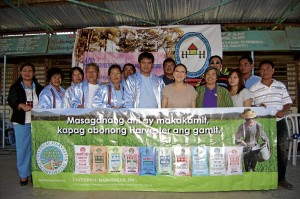
MANILA, Philippines—As recently as 10 years ago, Milagros Ong-How did not know the first thing about nitrogen, phosphorus and potash, and how the land needed these vital nutrients in order to produce abundant and healthy crops.
But since she and her husband put up Universal Harvester Inc. in 2003, she has mastered the intricacies of the fertilizer industry and has transitioned from being a mere supplier of fertilizers into a valuable ally of farmers in their quest to increase their yield and improve production methods.
Science is nothing new to the biology graduate of the University of the Philippines, but How says that she was more familiar with ammonia since that was the main chemical that her mother distributed when she was still in college.
“I was already helping my mother while I was still in college. She needed me because my father died when I was just 11 years old. I dealt with the small market that needed ammonia like those in refrigeration and cold storage,” says How, who once dreamt of becoming a doctor.
When she shelved that dream and went into the family business full time after finishing college, she gradually expanded from ammonia to include other chemicals such as hydrochloric acid because her customers were asking for them.
“They were asking me if I had other chemicals besides ammonia because they needed them, too. My customers were the ones who eventually introduced me to chemical fertilizers,” says How.
And said she quickly found out that, with the rural Philippines heavily into agriculture, there was a huge market for them.
How adds that as she got more involved in the fertilizer business, she discovered that agriculture is where her heart and her business acumen truly belong.
“I became more and more interested in helping the farmers improve their yield through the use of fertilizers. For so long, they did not employ any scientific approach to applying fertilizers,” says How. “Some of them were also victimized by people who would sell them fertilizers that were not according to specifications, which was why their yield did not improve.”
And if there is one thing that How knows like the back of her hand, it is chemical specification, considering her many years in the chemical distribution business.
How says this is why UHI, where she is executive vice president, subjected itself to audits by international certification agencies to make sure that its manufacturing facilities can give the farmers top-quality fertilizers that they deserve.
UHI has two plants in the Special Economic Zone in Calamba, Laguna, and its Quality Management System was established and certified by SGS Philippines Inc. and TUV/SUD Certification.
It is not cheap nor is it easy to secure these certifications. But How says she was committed to meeting high standards to be able to compete with imported products in the market, which continues to grow given the Philippines’ expanding population.
The great growth potential of the industry fills How with enthusiasm and excitement to further grow the business by dealing directly with farmers who use her products and point her in the right direction when it comes to formulations that work best with their crops.
“This is all part of the learning process. In business, you have to be willing to learn continuously and also open to taking risks because there are a lot of risks,” says How. “We are, for example, very much affected by weather because, in bad weather, the ships won’t be able to bring down produce, then moisture will also affect the quality of fertilizer. There is also the problem with the fluctuating prices of fuel and also the movement of foreign exchange. There are really many aspects of the business that are outside my control.”
How says that because of these risks, there have been times when she asked herself whether she would be better off shifting to another business. But she says that she did not give herself the option to turn back because she believes that what she provides is not just a product but also a valuable service to the farmers.
“The greatest thing about the business is that you get to be friends with the farmers. I end up forgetting about the business side because I get joy from being of help to them. The more I help them, the more I help myself,” explains How.
This is why UHI grabbed the opportunity to mount a search for The Outstanding Farmers of the Philippines (TOFARM) 2012, together with JCI Philippines.
The nationwide awards program seeks to recognize achievers and achievements in the agriculture sector in 2012, and to encourage the youth to venture into agriculture.
TOFARM will give out 11 awards this year, says TOFARM project chairman Rommel Cunanan. There will be six in the individual category and five in the group category. Nominations will be accepted until September 30 and awarding will take place in December.
How says farmers and the agriculture sector have to be recognized as they play “the most crucial role in our survival as a people, and hold the key to our collective health, wealth and progress as a nation.”
“It makes me sad to hear that many of today’s generation are no longer interested to till the land of their fathers or to pursue their family livelihood in agriculture. Instead, most want to pursue city jobs or become doctors, lawyers and engineers. But as our national hero Jose Rizal said, not all can be doctors. Some will have to stay and cultivate the land,” How says. “This is why our mission and vision is to make agriculture attractive for the next generations and for the entire country once again.”

